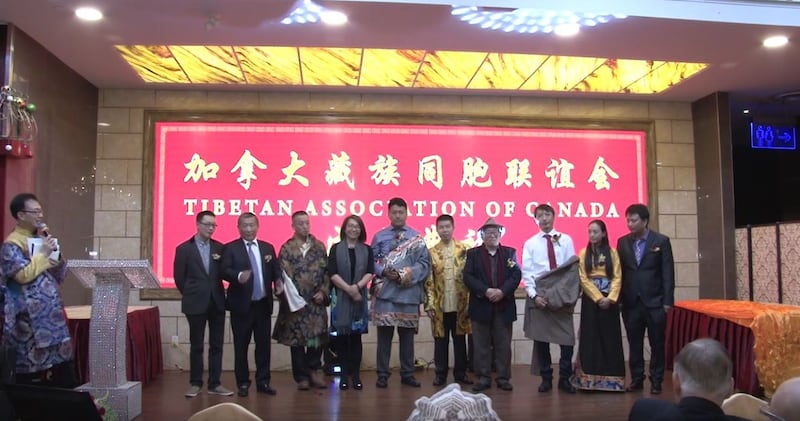A new Tibetan-Canadian organization promoting Beijing’s rule in Tibet, and which Chinese state media said had received a letter of support from Prime Minister Justin Trudeau, is a front for the Chinese government, according to Tibetan activists and advocacy groups.
The Tibetan Association of Canada (TAC) held a lavish launch party in Toronto on April 20, attended by local politicians, during which the head of the organization praised how China had improved the lives of Tibetans through “democratic reform” in the 60 years since the People’s Liberation Army put down a Tibetan rebellion against Chinese rule in Tibet.
Signs hung at the launch party were written in English and Chinese, not Tibetan, while attendees were led in singing the Chinese national anthem.
A representative of Canadian Liberal Party lawmaker Shaun Chen was at the TAC event, according to reports by official Chinese media, while ruling Conservative Party member of the Ontario legislature Vincent Ke and Toronto city councillor and former Liberal MP Jim Karygiannis were also present.
Chinese media reporting on the event also noted that the TAC had received letters of congratulations from Canadian Prime Minister Justin Trudeau and Minister of Immigration Ahmed Hussen, referring to documents that appeared to be printed on official letterhead and were circulated on social media.
On Tuesday, however, the offices of both officials said the letters—which contain multiple spelling and grammatical errors—had been faked and pledged to investigate their source.
While there is no direct evidence linking the TAC and the Chinese government, a group of six different Tibetan organizations in Canada released a statement on Tuesday condemning the newly formed organization, and claiming that it had “forged” the letters from Trudeau and Hussen in a bid to “mislead” Canada’s government and the public.
Other Tibetan advocacy groups, including Washington-based International Campaign for Tibet (ICT), have noted that the Confederation of Toronto Chinese Canadian Organizations (CTCCO) was involved with the launch event, which they say is publicly known in Canada to be an entity that works closely with the Chinese government.
Sonam Lankar, president of the Canadian Tibetan Association of Ontario, told RFA’s Tibetan Service that his organization is “certain” that the TAC is operating under the Chinese government’s influence and with its support, although he was unable to provide details of the group’s relationship with Beijing.
“Only few Tibetan participants were seen at this grand event, and some of them have associations with the Dorje Shugden,” he added, referring to a Buddhist sect that a 2015 Reuters news agency investigation determined has the backing of China’s ruling Communist Party.
According to the Reuters report, China paid senior Shugden monks to plan and coordinate the activities of the sect’s followers overseas, controlled and funded by the Communist Party’s shadowy ideological unit, the United Front Work Department.

Response to activism
Tsering Shakya, a professor of Tibetan history at the University of British Columbia, told RFA that the establishment of the TAC was a direct response to greater activism in Canada on behalf of Tibetans in exile opposed to Chinese rule in Tibet.
“In recent years, young influential Tibetan leaders like [Canadian politician] Bhutila Karpoche and [University of Toronto Student Union President] Chemi Lhamo have emerged, alarming the Chinese government and leading to these kinds of actions,” he said.
Bhutila Karpoche was elected to the Legislative Assembly of Ontario in the 2018 provincial election, making her the first person of Tibetan descent ever elected to public office in North America.
The launch of the TAC came two months after ethnic Tibetan Chemi Lhamo, who was born in India and is a vocal supporter of Students For a Free Tibet, was elected president of the University of Toronto’s Scarborough Campus Students’ Union (SCSU).
Shortly after her election, Lhamo faced a torrent of online abuse and harassment, prompting Toronto police to open an investigation into whether she was the victim of a hate crime.
A petition calling on Lhamo to step down garnered nearly 10,000 signatures, and screenshots calling her a "Tibetan separatist" were shared via social media.
The Chinese consulate in Toronto has denied any involvement in the mobilization of Chinese students against Lhamo, saying the online comments were spontaneously generated by "objective facts and patriotic enthusiasm."
ICT has documented what it says are “great efforts” by China’s government to spread confusion about Tibet in the international community.
The group notes that in 2000, China issued a directive for “Tibet-related external propaganda and Tibetology work in the new era,” which outlined a strategy to “nurture several groups of hard-working people, who, as well as understanding our government policies and strategies, have good knowledge of Tibetology and foreign languages, and have expertise in external propaganda work.”
“The setting up of these so-called Tibetan associations is very much part of this long-term strategy,” ICT warns.
In the U.S., bicameral and bipartisan legislation has been introduced in Congress in response to China’s attempts to influence operations within the country, known as the “Countering the Chinese Government and Communist Party’s Political Influence Operations Act.”
The legislation aims to ensure that “United States citizens, particularly Chinese Americans and members of the Chinese, Uyghur, and Tibetan diaspora who are who are often the victims and primary targets of malign political influence operations, are protected.”
Reported by RFA’s Tibetan Service. Translated by Tenzin Dickyi. Written in English by Joshua Lipes.
